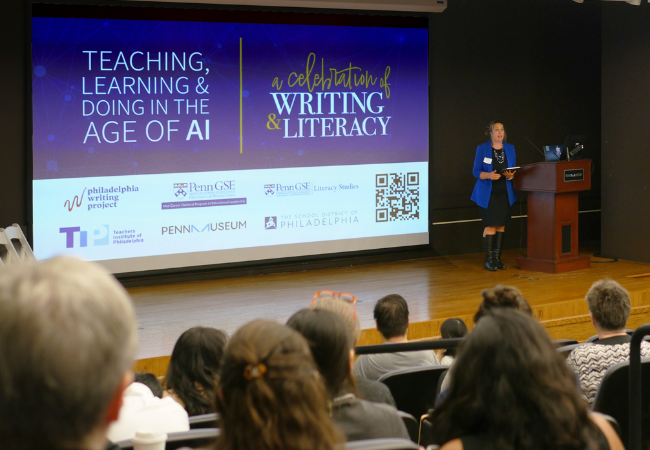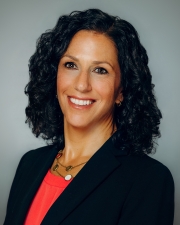Philly teachers explore education in the age of AI at PhilWP’s annual Celebration of Writing and Literacy

PhilWP Faculty Director Amy Stornaiuolo speaks at the 2024 Celebration of Writing and Literacy.
As artificial intelligence becomes more advanced and accessible, classrooms are feeling its impact.
Generative AI presents opportunities for improving pedagogy and enhancing student learning. At the same time, it poses risks, such as students using it to sidestep writing, studying, and other important learning experiences.
The focus of this year’s Celebration of Writing and Literacy conference, “Teaching, Learning, and Doing in the Age of AI,” brought together educators and researchers to explore AI’s role in education. Attendees presented their own research during sessions throughout the day, with many exploring AI-related topics, while others shared work regarding scientific literacy and writing assessment. The event was co-hosted by the Philadelphia Writing Project (PhilWP), Penn GSE’s Literacy Studies and Mid-Career Doctoral programs, the Teachers Institute of Philadelphia, the School District of Philadelphia (SDP), and the Penn Museum.
In her opening remarks, Penn GSE Dean and George and Diane Weiss Professor of Education Katharine Strunk emphasized the critical role educators play in the lives of Philadelphia-area students. She also highlighted the long-standing partnership between PhilWP and SDP.
Attendees valued this partnership, and the continued programming and support that PhilWP offers educators. Since 1986, PhilWP has partnered with SDP and other schools in the area to provide educators with professional learning and scholarship opportunities.
“The connections that I’ve made with other teachers here and the community have been amazing,” said SDP teacher Alaya Booker.
The event exposed educators to new ways of thinking about AI, from its potential to enhance classroom teaching to its ability to personalize learning for students.
Keynote speaker Antero Garcia, a professor of education at Stanford University, discussed AI’s influence on writing instruction and its broad implications for civic education.
“When we give over writing opportunities to machines, we give over civic agency as well,” Garcia said. “We should think critically about the ways AI is currently being harnessed for civic purposes.”
Plenary speaker Tricia Ebarvia, director of diversity, equity, and inclusion at Greene Street Friends School in Philadelphia, emphasized AI’s role in reinforcing biases in the data it uses. She urged educators to remain vigilant about these biases when integrating AI into their classrooms.
The conference left attendees with fresh ideas and strategies to use in their own classrooms. That’s exactly the outcome PhilWP co-directors Amy Stornaiuolo and Jen McLaughlin Cahill were hoping for.
“[PhilWP] brings educators together to collaborate and use new tools and resources,” McLaughlin Cahill said. “A conference like this allows educators to discuss the impact of developments like AI, to share classroom practices, to collectively use their voices to effect change, and to explore how these inquiries can enhance their schools and communities.”



